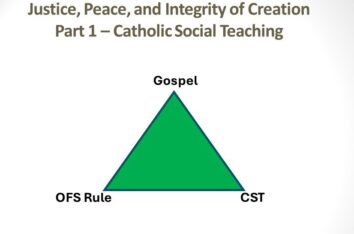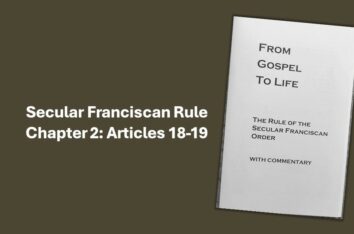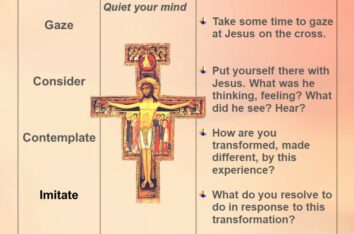Dear Brothers and Sisters,Today’s lesson uses the early writings of St. Francis. One of the best ways to learn about the soul of a saint is to read their original writings.Reminder: if you click on the first link to Franciscan Traditions – you will find tons of material for ongoing formation. Just read the material, create questions and you are ready to go to the next gathering with a plan for your members to learn together. Or you can purchase a book with the questions at the end of each Chapter such as For All The Saints: St. Francis’s Five Point Plan for Salvation by Tom Bellos OFS, former National Minister, (Published by Tau Publishing)If you are looking for some ideas, just send an email, and I will get back to you. Peace, Dona++++++++++++++++++++++++++++++++++++++++++++++++++
Focus on the Admonitions (#11 and 12)
https://www.franciscantradition.org/francis-of-assisi-early-documents/the-saint/writings-of-francis/the-undated-writings/the-admonitions/149-fa-ed-1-page-133
[XI: Let No One Be Corrupted by the Evil of Another]1Nothing should displease a servant of God except for sin. 2And no matter how another person may sin if a servant of God becomes disturbed and angry because of this and not because of charity, he is storing up guilt for himself. Rom 2:5 3That servant of God who does not become angry or disturbed at anyone lives correctly without anything of his own. a 4Blessed is the one for whom nothing remains except for him to return to Caesar what is Caesar’s and to God what is God’s. Mt 22:21
[XII: Knowing the Spirit of the Lord]
1A servant of God can be known to have the Spirit of the Lord in this way: 2if, when the Lord performs some good through him, his flesh does not, therefore, exalt itself, because it is always opposed to every good. 3Instead he regards himself the more worthless and esteems himself less than all others.
Questions to discuss or to answer in your journal
+ Come, Holy Spirit! Open my mind and heart as I contemplate Admonition XI.
· When have I focused on another person’s sin and judged them because of it?
· What do I find most difficult about not becoming “angry or disturbed at anyone?”
· Why do you think Francis ends this admonition with the sentence from Matthew about “returning to Caesar what is Caesar’s and to God what is God’s?”
+ Admonition XII—Those of us who are, or aspire to be, servant leaders should pay close attention to this one!
· Why do you think St. Francis asks his followers to esteem themselves less when the Lord accomplishes something through them?
· Do you think he wants us to have low self-esteem? Why or why not?
· Do you think he is asking us to stop trying to do great things?
++++++++++++++++++++++++++++++++++++
Enfoque en las admoniciones de San Francisco (Admoniciones 11 y 12)
https://www.franciscanos.org/esfa/escritossf.html#adm
Cap. XI: Que nadie se altere por el pecado de otro
1Al siervo de Dios nada debe desagradarle, excepto el pecado. 2Y de cualquier modo que una persona peque, si por esto el siervo de Dios se turba y se encoleriza, y no por caridad, atesora para sí una culpa (cf. Rom 2,5). 3El siervo de Dios que no se encoleriza ni se conturba por cosa alguna, vive rectamente sin propio. 4Y bienaventurado aquel que no retiene nada para sí, devolviendo al César lo que es del César, y a Dios lo que es de Dios (Mt 22,21).
Cap. XII: De cómo conocer el espíritu del Señor
1Así se puede conocer si el siervo de Dios tiene el espíritu del Señor: 2si, cuando el Señor obra por medio de él algún bien, no por eso su carne se exalta, porque siempre es contraria a todo lo bueno, 3sino que, más bien, se tiene por más vil ante sus propios ojos y se estima menor que todos los otros hombres.
Preguntas para platicar o responder en su diario
+ ¡Ven, Espíritu Santo! Abre mi mente y mi corazón mientras contemplo la Admonición XI.
• ¿Cuándo me he concentrado en el pecado de otra persona y la he juzgado por ello?
• ¿Qué me resulta más difícil de no “enojarme o molestarme con nadie?”
• ¿Por qué cree usted que Francisco termina esta advertencia con la frase de Mateo sobre “devolver al César lo que es del César y a Dios lo que es de Dios?”
+ Admonición XII: ¡Aquellos de nosotros que somos, o aspiramos a ser, líderes siervos debemos prestar mucha atención a esta admonición!
• ¿Por qué cree que San Francisco pide a sus seguidores que se estimen menos a sí mismos cuando el Señor logra algo a través de ellos?
• ¿Cree usted que él quiere que tengamos baja autoestima? ¿Por qué o por qué no?
• ¿Cree que nos está pidiendo que dejemos de intentar a hacer grandes cosas?
Diane F. Menditto, OFSChair, National Formation Commission
Minister, Our Lady of the Angels Region



